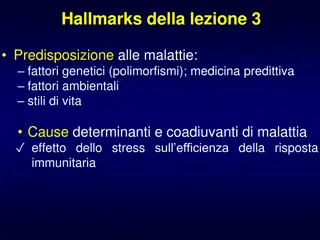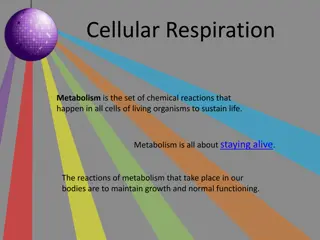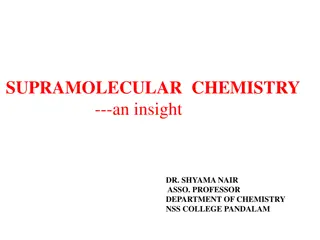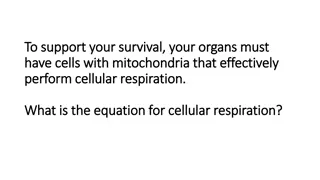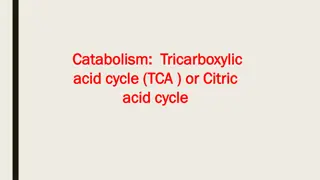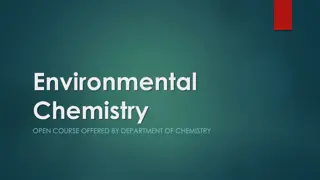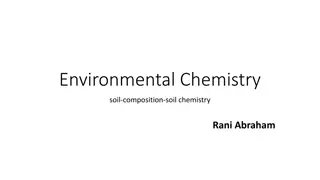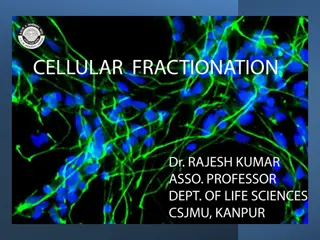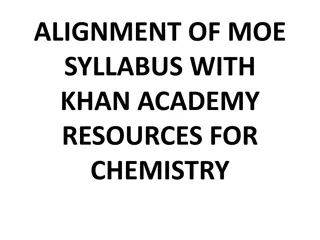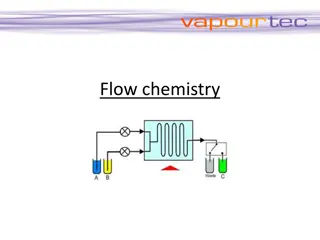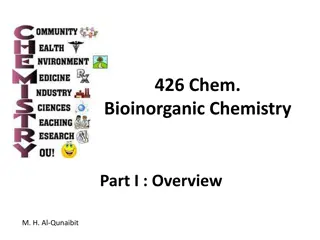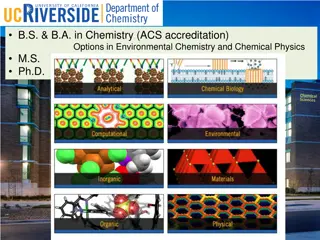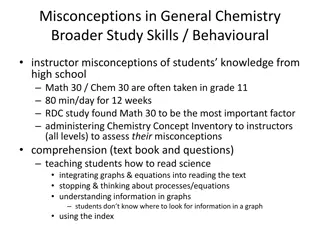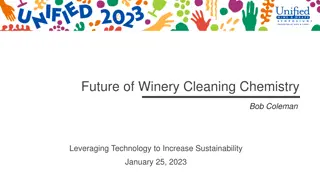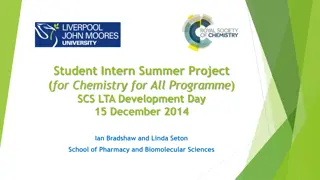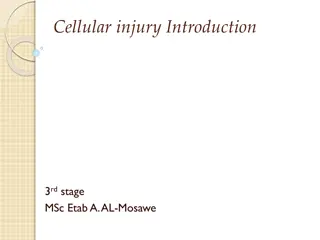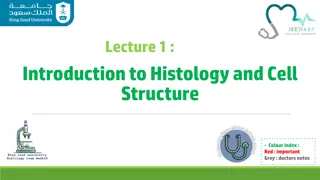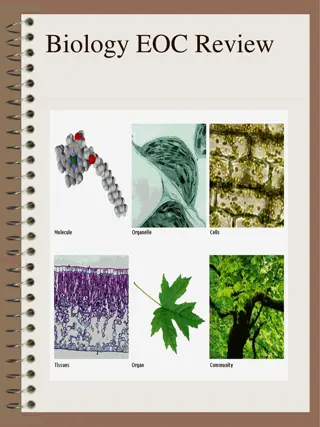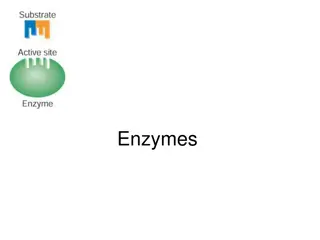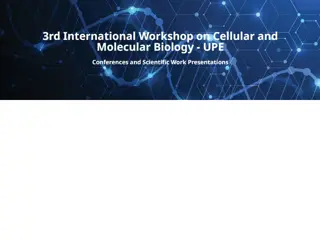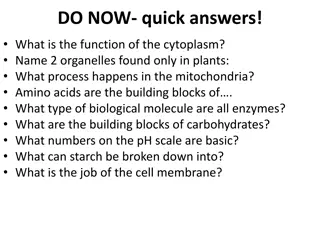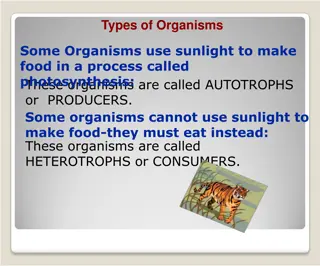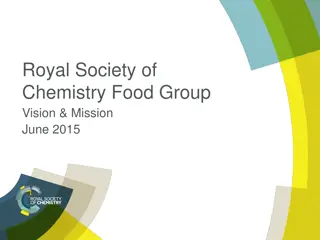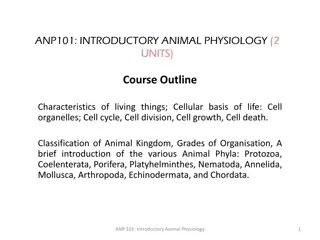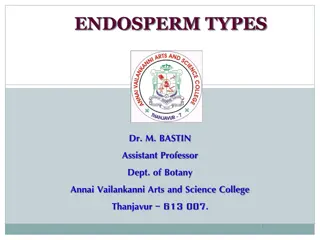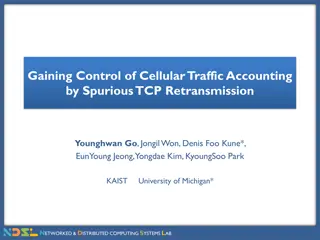Understanding Cellular Pathology: Response to Stress and Disease Predisposition
Explore the hallmarks of cellular pathology, including factors influencing disease predisposition such as genetics, environmental factors, and lifestyle. Delve into the cellular response to stress, adaptive and pathological reactions, and key stressors disrupting cellular homeostasis. Uncover how ce
0 views • 51 slides
Introduction to Co-ordination Chemistry: Fundamentals and Applications
Explore the fascinating field of coordination chemistry, delving into the complexity of compounds and the coordination bonds that govern their structures. Discover the history, key concepts, and applications of coordination chemistry through a detailed examination of coordination compounds, bonding
13 views • 73 slides
Understanding Motor Proteins and Cytoskeletal Dynamics in Cell Biology
Motor proteins, such as myosin, kinesin, and dynein, utilize chemical energy to move along cellular tracks, influencing processes like muscle contraction, organelle movements, and cellular migration. With the ability to translocate using ATP hydrolysis, these proteins play crucial roles in various c
5 views • 14 slides
Overview of Glucose Metabolic Pathways in Clinical Chemistry
Explore the major metabolic pathways of glucose, including glycogenolysis, gluconeogenesis, glycolysis, and more. Understand the production, utilization, catabolic, and anabolic cycles of glucose in cellular metabolism. Learn about key concepts such as hexose interconversion, HMP/PPP, Krebs cycle, a
4 views • 29 slides
Fuel Your Success Conquer the IB Chemistry (SL and HL) Examination
Ignite your potential and achieve excellence in the IB Chemistry (SL and HL) Examination with our comprehensive study resources. Access practice exams, study guides, and expert guidance to excel in your test. Start your journey towards academic success today!\nClick Here to Get IB-Chemistry Dumps Wi
4 views • 6 slides
Understanding Cellular Respiration and Metabolism in Living Organisms
Cellular respiration is a vital process in all living cells, producing energy through chemical reactions. Metabolism, consisting of anabolism and catabolism, maintains growth and function. ATP plays a central role as energy currency in cells. Through stages like glycolysis and the Krebs cycle, cellu
0 views • 16 slides
Exploring Supramolecular Chemistry: Insights and Applications
Supramolecular chemistry delves into the chemistry of molecular assemblies, intermolecular bonds, and non-covalent interactions, leading to the formation of supra-molecules through aggregation of molecular subunits. Concepts like molecular recognition, self-organization, and host-guest chemistry pla
0 views • 18 slides
Understanding Cellular Respiration and Oxygen Delivery
Cellular respiration, a vital process for organ survival, involves mitochondria performing cellular respiration by utilizing glucose and oxygen. Glucose is derived from diet or body breakdown, while oxygen enters through the respiratory system, facilitated by red blood cells in the circulatory syste
0 views • 8 slides
Neo.Go Mobile Application Integration Settings
This guide provides detailed instructions for integrating the Neo.Go mobile application with Neo security system panels using Ethernet or Cellular communication. It covers programming steps, data plan considerations, and settings for both Cellular and Ethernet communications. Ensure a proper data pl
0 views • 26 slides
Understanding Wireless Wide Area Networks (WWAN) and Cellular Network Principles
Wireless Wide Area Networks (WWAN) utilize cellular network technology like GSM to facilitate seamless communication for mobile users by creating cells in a geographic service area. Cellular networks are structured with backbone networks, base stations, and mobile stations, allowing for growth and c
2 views • 17 slides
Overview of Cellular Respiration Pathways and ATP Generation
Cellular respiration involves key processes like the Tricarboxylic Acid Cycle (TCA), Electron Transport Chain, and ATP generation pathways. The TCA cycle utilizes Acetyl-CoA to produce energy-rich molecules, while the Electron Transport Chain facilitates ATP synthesis through oxidative phosphorylati
0 views • 18 slides
Environmental Chemistry Open Course: Understanding Pollution and Control Measures
Dive into the world of environmental chemistry with this comprehensive open course offered by the Department of Chemistry. Explore the causes, effects, and control measures of air, water, soil, noise, thermal, light, and radioactive pollutions. Gain insights into pollution terminology, water quality
3 views • 9 slides
Explore Cellular Respiration Through POGIL Activities
Dive into the world of cellular respiration through POGIL activities that cover topics such as glycolysis, Krebs Cycle, Electron Transport System, and more. Discover critical thinking questions and application problems related to cellular respiration processes and their real-world implications.
0 views • 6 slides
Understanding Soil Chemistry and Redox Reactions in Environmental Chemistry
Soil chemistry plays a crucial role in sustaining healthy soils by influencing nutrient availability through oxidation and reduction processes. Redox reactions in soil are impacted by factors like oxygen content and water presence, affecting nutrient supplies. The redox status of soil reflects its n
1 views • 92 slides
Cellular Fractionation: Techniques and Applications
Cellular fractionation is a crucial process for separating cellular components to study intracellular structures and proteins. It involves homogenization, centrifugation, and purification steps to isolate organelles based on their properties like density and shape. This method provides valuable insi
6 views • 11 slides
Understanding Chemistry through Open-Ended Questions
The content provides a detailed assessment of student responses to open-ended chemistry questions related to hydrogen peroxide and its applications in teeth whitening gels. Various student answers are analyzed based on their understanding of the chemistry concepts involved, with explanations given f
1 views • 18 slides
Comprehensive Alignment of MOE Chemistry Syllabus with Khan Academy Resources
This comprehensive alignment showcases the correlation between the Ministry of Education (MOE) chemistry syllabus and the educational resources provided by Khan Academy. It covers various topics in chemistry such as the particulate nature of matter, atomic structure, chemical bonding, stoichiometry,
1 views • 9 slides
Understanding Flow Chemistry for Efficient Chemical Reactions
Flow chemistry, also known as continuous flow or plug flow chemistry, revolutionizes chemical reactions by running them in a continuous flow stream. This dynamic process offers efficient manufacturing of chemical products with precise control over critical parameters like stoichiometry, mixing, temp
2 views • 7 slides
Exploring Bioinorganic Chemistry: Connecting Inorganic and Biochemistry
Bioinorganic Chemistry bridges the gap between inorganic chemistry and biochemistry, understanding the vital role of inorganic elements in living systems. This interdisciplinary field delves into the structure, function, and exploitation of metal ions in biological processes, emphasizing their inter
0 views • 47 slides
UC Riverside Chemistry Program: Excellence in Education and Research
UC Riverside's Chemistry Program offers a range of options in ACS-accredited Chemistry education, with highlights including a distinguished faculty, substantial research funding, and high rankings. The program also boasts a Nobel Prize-winning faculty member and a comprehensive curriculum that cover
0 views • 5 slides
Overcoming Misconceptions in Chemistry Education
Addressing misconceptions in general chemistry education, focusing on student knowledge from high school Math and Chemistry courses. Emphasis on student motivation, learning strategies, and common misconceptions in understanding scientific concepts. Strategies for enhancing comprehension, applicatio
0 views • 12 slides
Innovations in Winery Cleaning Chemistry for Sustainability
Explore the future of winery cleaning chemistry through leveraging technology and sustainable practices. Considerations for chemistry selection focusing on safety, hazardous materials, employee well-being, and environmental impact are highlighted. Current cleaning chemistry practices, including the
0 views • 19 slides
Overview of LJMU Chemistry for All Programme Summer Internship Project
LJMU's Chemistry for All Programme aims to enhance student experiences through summer internships, curriculum development, and outreach activities. The project, funded by the Royal Society of Chemistry, involves a cross-university collaboration to engage local schools and foster interest in chemistr
0 views • 21 slides
Understanding Cellular Injury and Its Manifestations
Cellular injury can occur due to various factors like physical trauma, chemicals, radiation, and biologic agents. This process can lead to reversible or irreversible damage in cells, affecting their normal functions and possibly leading to cell death. Manifestations of cellular injury include cellul
0 views • 9 slides
Introduction to Histology and Cell Structure
Histology is the microscopic study of normal tissues utilizing light and electron microscopes. This field explores the composition and function of cells, focusing on the nucleus, cytoplasm, organelles, and inclusions. Thin tissue sections stained with Haematoxylin and Eosin reveal distinct cellular
0 views • 23 slides
Exploring Cellular Structures in Quizbowl Biology
Biology in quizbowl competitions often focuses on understanding cellular structures, from organs to organelles. Players encounter questions about various organelles like mitochondria, ribosomes, chloroplasts, and the Golgi body. Ribosomes, though not classified as organelles, play a critical role in
0 views • 27 slides
Understanding Key Concepts in Biology and Chemistry
Exploring the fundamentals of biology and chemistry, including methods for problem-solving, characteristics of life, organic compounds in organisms, and the role of enzymes in metabolism. Learn about cellular organization, reproduction, metabolism, homeostasis, heredity, response to stimuli, growth
0 views • 21 slides
Understanding Enzymes: The Catalysts of Cellular Reactions
Enzymes play a vital role in controlling cellular reactions by speeding up processes without being consumed themselves. They are biological catalysts made of proteins, with each enzyme having a specific shape for its designated molecule. This summary highlights the importance of enzymes in cellular
0 views • 47 slides
Highlights from the 3rd International Workshop on Cellular and Molecular Biology
Explore images from the 3rd International Workshop on Cellular and Molecular Biology showcasing various aspects of the event and the participation of experts in the field. Dive into the world of cellular and molecular biology through these visual representations.
0 views • 10 slides
Cellular Processes and Functions Explained
The cytoplasm is essential for cell function, housing organelles like chloroplasts and vacuoles unique to plants. Mitochondria facilitate cellular respiration, while amino acids form proteins. Enzymes are proteins, and carbohydrates consist of simple sugars. Basic pH numbers range from 8 to 14. Star
0 views • 24 slides
Exploring Cellular Biology: From Cells to DNA
Delve into the intricacies of cellular biology by comparing prokaryotic and eukaryotic cells, investigating cellular processes, understanding viral structures and reproduction, exploring the cell cycle stages, examining specialized cells, and recognizing the crucial roles of DNA and RNA in cell diff
0 views • 42 slides
Understanding Cellular Respiration: Energy Production in Organisms
Organisms can be classified into autotrophs that use sunlight for photosynthesis and heterotrophs that rely on consuming food. Regardless of food source, all organisms obtain energy through cellular respiration, a process that converts stored chemical energy into ATP. This energy currency is essenti
0 views • 21 slides
Energy-Efficient Handover Triggering for Cellular Networks
Mobile devices play a crucial role in today's world, with a surge in mobile subscriptions and applications. However, energy consumption, particularly battery life, remains a challenge. The study focuses on Application-Based Handover Triggering (AHT) as a solution to optimize energy usage in cellular
0 views • 24 slides
Royal Society of Chemistry Food Group Vision & Mission Summary
The Royal Society of Chemistry Food Group aims to lead, promote, and disseminate the understanding and importance of chemistry in food. Their vision is to enhance food and nutrition security through advancing the chemistry of food ingredients. They strive to engage with various communities to promot
0 views • 4 slides
Introduction to Animal Physiology and Cellular Biology Overview
This comprehensive course delves into the fundamental aspects of animal physiology and cellular biology. Topics covered include the characteristics of living organisms, cellular organelles, the cell cycle, division, growth, and death. Additionally, the course introduces the various animal phyla, fro
0 views • 43 slides
Understanding the Types of Endosperm in Angiosperms
Endosperm is the nutritive tissue formed in angiosperms through triple fusion, serving to nourish the embryo. There are three main types of endosperm: Nuclear, Cellular, and Helobial, each characterized by distinct modes of development. Nuclear endosperm features repeated division of the primary nuc
0 views • 16 slides
Biochemistry and Chemistry Elective Courses Overview at SRCASW
The Shaheed Rajguru College of Applied Sciences for Women offers elective courses in Biochemistry and Chemistry. The Biochemistry course covers biomolecules like amino acids, proteins, carbohydrates, lipids, and nucleic acids, emphasizing their properties and functions. It also includes practical ex
0 views • 19 slides
Alternative Cellular Avalanche Model for Solar Flares
Exploring an alternative cellular avalanche model based on the maximum release of energy during solar flares, this research delves into optimizing models to study the quasi-static evolution of coronal magnetic fields. Through a series of image objects and studies, the study presents various cellular
0 views • 16 slides
Understanding Cellular Traffic Accounting and TCP Retransmissions
Delve into the complexities of cellular traffic accounting, focusing on the impact of TCP retransmissions on network data billing. Explore the challenges faced by cellular providers in accurately charging subscribers for data usage amidst increasing traffic volumes. Consider the implications of TCP
0 views • 31 slides
Cellular Network Positioning Techniques for Location Estimation
Utilizing cellular signal strength information for positioning devices within a network, this study explores network-side positioning methods such as fingerprinting in cellular networks. The research delves into the process of estimating device locations by analyzing received signal strengths from n
0 views • 29 slides
